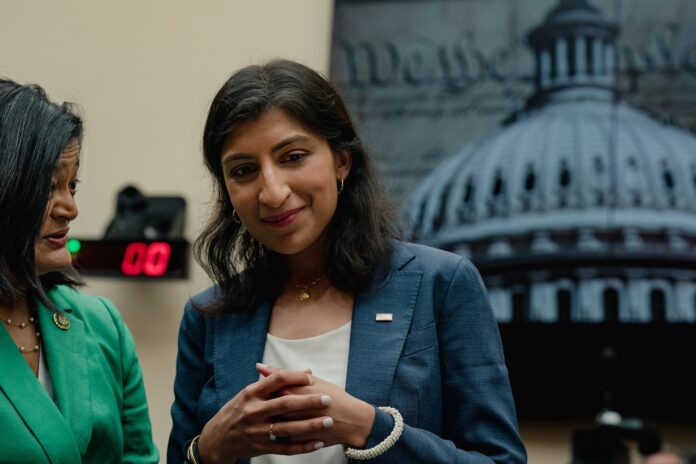Khan rapidly became a hero to progressives who shared her vision of a reinvigorated antitrust doctrine. By 2018, her article had been viewed almost 150,000 times, which is a breakaway hit in the legal world. There was an admiring New York Times profile, then an associate professorship at Columbia Law School. In June 2021, President Biden named her chair of the Federal Trade Commission, the youngest person to hold that post. The 32-year-old firebrand soon set about putting her theories into practice.
Under her leadership, the FTC has taken an aggressive approach that pushed the boundaries of antitrust law as it’s currently practiced. But many of Khan’s watchers suspected they were merely preludes to the Big Show: the case against Amazon itself. On Tuesday, the FTC finally filed it, in cooperation with 17 states. (Amazon founder Jeff Bezos owns The Washington Post. Patty Stonesifer, The Post’s interim chief executive, is on Amazon’s board of directors.)
The complaint reads like the denouement of Khan’s long narrative arc — familiar themes are restated, but the character has evolved somewhat to better fit the situation. Whether that’s enough to assure victory, however, very much remains to be seen.
Among the familiar motifs is excruciatingly fine definitions of the relevant market. Six years ago, when Amazon was wildly popular but barely profitable, she wrote you could see predatory behavior if you focused on very particular markets — for example, how Amazon priced best-selling e-books, rather than all e-books. Today, rather than looking at all retail, or even e-commerce, the FTC complaint argues that Amazon has gained utter dominance of the “online superstore” market, a market that seems primarily defined by … describing Amazon. It’s a little like arguing that I have an anticompetitive monopoly over Post columnists named Megan McArdle.
Somewhat more plausibly, the complaint argues that we are finally witnessing the monopolistic use of market power Khan foreshadowed in that same article: “Recognizing that enduring early losses while aggressively expanding can lock up a monopoly, investors … have given Amazon a free pass to grow without any pressure to show profits.” Now, the FTC suggests the feared abuses have finally materialized: Amazon is using its market clout to fend off price competition, degrade the customer experience and squeeze its third-party sellers in ways that ultimately translate into higher prices for consumers.
If this sounds rather closer to standard antitrust analysis than you might have been expecting, you’re not wrong. Perhaps this is just where the facts lead, but it’s also probably a necessary concession to reality — judges have recently quashed two of the FTC’s more expansive, creative suits, against Meta and Microsoft. But winning this case will mean proving that harm is actually taking place. It’s hard to know how likely that its, given that many key passages of the complaint have been heavily redacted (because Amazon demanded it, according to a staffer at the FTC).
“Amazon has implemented an algorithm,” reads a typical passage, “for the express purpose of deterring other online stores from lowering prices. [redacted]. Rather than trying to compete, Amazon uses [redacted].”
I’m sure this sounds terrible — whatever “this” is.
The unredacted parts, however, seem a bit underwhelming. The complaint makes a decent case that Amazon has enough market power to squeeze the everliving bejeezus out of its third-party sellers. But markets have always been hard on sellers; we want them to be, because the relentless race to sell better, cheaper, faster has driven two centuries of increasing prosperity. To merit getting involved, the government needs to show that sellers are being disadvantaged in some illegitimate way that’s broadly bad for society.
So the FTC argues that Amazon is ultimately harming consumers. For example, the company refuses to offer the best product placement slots to products from third-party sellers that are offered at a lower price on other sites. The FTC alleges this forces those sellers to raise prices elsewhere, which makes it a kind of price fixing. Amazon retorts that it’s simply trying to get the best price for its customers.
Which seems possible, and illustrates one of the core difficulties of antitrust enforcement: The line between anti-competitive behavior and ultracompetitive behavior is often shockingly hard to draw. That’s one reason that courts ended up focusing on narrow, measurable impacts such as consumer prices rather than broader, more nebulous harms. So far, Khan’s challenge to that framework has been more successful in theory than in practice. And if the FTC keeps swinging for the fences, and losing, eventually she’s likely to be taken out of the game.



